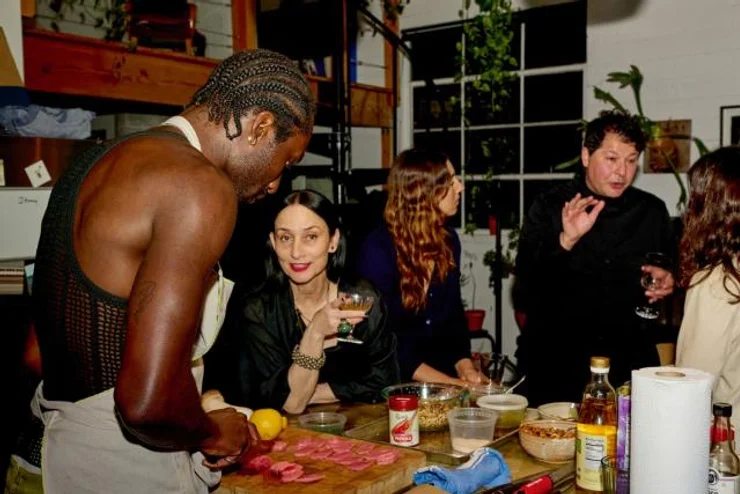By: Andy Dong
One of DeVonn Francis’ best traits is hospitality. Francis comes from Jamaican immigrants who regularly hosted parties in their basements. Francis also received hands-on experience with cooking when he was growing up by helping around in the family restaurant and cooking with his mom.
Francis can whip up juicy cabbage steaks, sizzling pork collars, flavorful rice, and rum cakes for a several-course dinner. This was what he pulled off when he recently cooked for friends at the downtown Los Angeles loft of Fabienne Toback, who is the producer of “High on the Hog”.
Francis has been in many kitchens but has also studied performance art at Cooper Union. Lately, he has also been trying to involve more culture in dining experiences. The many dinner parties that he hosts are very effective at putting food from around the world on the table.
Yardy World, Francis’ event studio, was created to connect to his Caribbean heritage and to “take up space however it feels good and whatever way we want to,” Francis said. Francis also thinks that restaurants are not entirely safe for people with different backgrounds. He said. “Hospitality to me means you get to prioritize care for everyone in the system,” not just the guest.
Toback says that Francis isn’t just focusing on food, but also spreading the word of representation of other cultures too. He is also tuned into big questions that involve philosophy: What community are we creating? Are we celebrating the past or the present?
Others chasing similar questions have founded their dinner clubs.
At 30 years old, Francis has already created his own company, published countless recipes, and dropped in on many shows. Francis even styled his mother in Bryant Terry’s cookbook.
While some chefs love to have people test them into making different cultures, Francis feels that he sometimes suffers from being forced to make other traditions that they aren’t locked into yet.
“I grew up eating so much cabbage,” Francis said. “It was always stewed to s—, unrecognizably stewed. But it was delicious, stewed cabbage and carrots. My dad would make me cut all the cabbage and carrots for the restaurant. There was a huge 32-quart pot that was taller than me. As a kid, I remember thinking, ‘I’m never gonna fill this pot, there’s not enough cabbage in the world to fill this pot.'”
The cabbage that Francis makes is served with coconut vinaigrette, and aromatic with garlic and rice vinegar. It’s topped off with lime juice, basil oil, parsley, and mint. “This cabbage is incredible,” Toback said. “It’s light and fresh and invigorating. Francis notes certain cuisines get pigeonholed, as sometimes happens with African American food: “Oh, Mexican food is heavy.” “Oh, Japanese food, I don’t like raw fish.” Francis is broadening how we understand food in terms of heritage, he said. He’s American, but his flavors reflect his Jamaican background.
Francis revealed that his ultimate goal is to continue Caribbean food and heritage and always to take one more step to give a recipe a background.
Sources: How a Jamaican American chef shows us the transforming power of the dinner party











